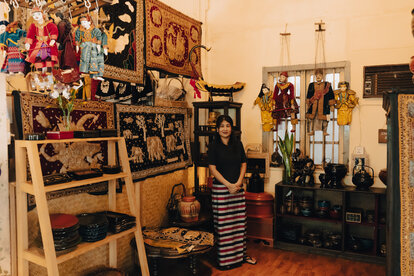women to women
"The owner of 'she creates,' an initiative aimed at enhancing business connections among women through WOMEN TO WOMEN."
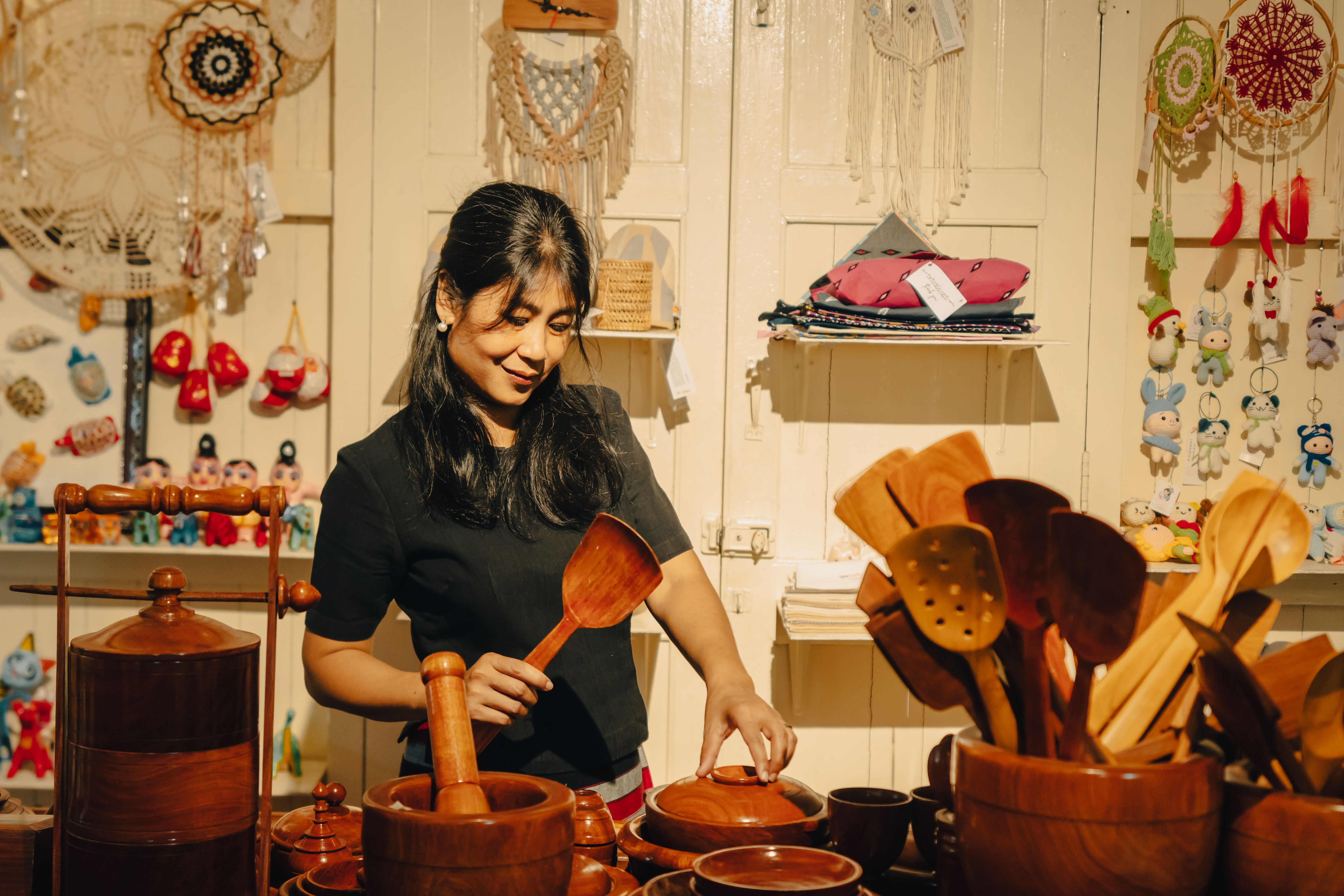
"Throughout the COVID-19 pandemic and its aftermath, female artisans across the country have faced significant challenges. Amidst these difficulties, Wai Wai Kyaw from Wai Wai noodle palace came up with the idea to form a collective group consisting of women entrepreneurs and female artisans to establish an association. Consequently, in March 2022, she initiated 'she creates,' gathering women creators at one platform. This month's women to women program will discuss the inception of 'she creates,' its purpose, and the anticipated benefits it aims to provide to women creators."
Question: How did you start your business?
Answer: "My name is Wai Wai Kyaw. I am from Momeik, northern Shan State. I arrived in Yangon between 2009 and 2010, seeking employment. Initially, I worked in Bogyoke Market selecting gems, which is my educational background. However, I found making 'potato chips' more interesting than choosing gems. I searched for work in shops, but it was difficult as the value of gems was high and not many hired. Finally, I got a job in a lady's shop, and I still consider her like a mother to me. I visit her on important days. Initially, I was employed on a trial basis for gem selection, but then I was hired full time. Subsequently, I worked in two more shops. With the money I earned from these jobs, which I had saved for about two years, I rented a small house and opened a guesthouse on Artillery Street, Latha Township, at house number 26 C. It had four rooms. For about a month, there were no guests, which worried me. But when tourism started flourishing around 2013/14 during U Thein Sein's presidency, foreigners began coming in large numbers, and hotels were not enough to accommodate them. That's when my small guesthouse with four rooms became fully occupied. The four rooms brought in about 270,000 MMK per month. I paid 400,000 MMK for monthly rent. Including utility bills, I was able to save around 800,000 MMK. Sometimes, I made around 300,000 MMK from ticket sales, leaving me with a monthly surplus of around 2 million MMK. After operating the small guesthouse for 13 months, I saved about 400,000 MMK, combining this with my previous savings. I then searched for a house with 10 rooms and found one on Kamayut, Garden Street No.31. I rented it and continued my business, making around 900,000 MMK a month. This success motivated me to expand further, looking for 20 to 30 more rooms. I found a building with 18 rooms on San Chaung, Thukha Street. However, when the Rakhine issue arose, I faced some challenges. I then decided not to use the upper floors and instead opened a small traditional wicker and ru-to bar, which catered to foreigners' tastes. At least 1,000 people visited monthly. Later, I opened Wai Wai’s Shan Noodle Shop and Ru-to Bar, starting with the small Shan noodle shop in Kamayut. Initially, it was not very successful, but after relocating to Thukha Street, the Shan noodle shop became quite popular. Then, I expanded further by opening another shop on Bogyoke Aung San Road in downtown. That’s how I reached my current situation."
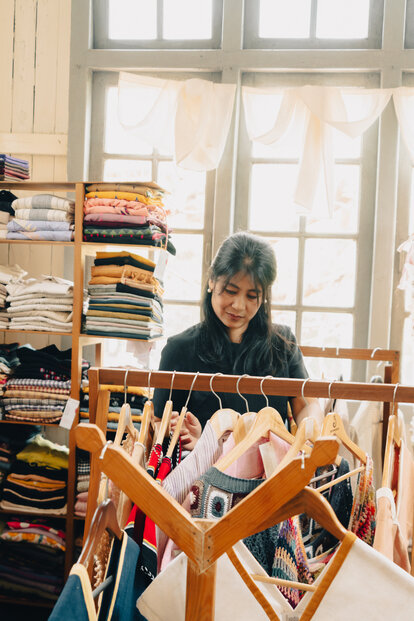
Question: "As a woman leading a business, what challenges did you face during your entrepreneurial journey?"
Answer: "The main challenge was language, as I interacted with the foreigner community. Initially, I wasn't fluent in English, but I had the desire to learn, so I didn’t feel discouraged. If you have the desire to learn, you can overcome any difficulty. In the beginning, it was tough to communicate a lot with foreigners and I asked many questions. Gradually, my listening improved, and it became easier. I'm still not perfect but I do have confidence when speaking with them. They also learn our language, so it's not strange. The key is to be able to communicate with each other. There’s nothing to fear, and it all went well."
Question: "When did you start She Creates, and why?"
Answer: "It started around March 2022, during International Women's Day. That's when I first met with my current collaborators and creators."
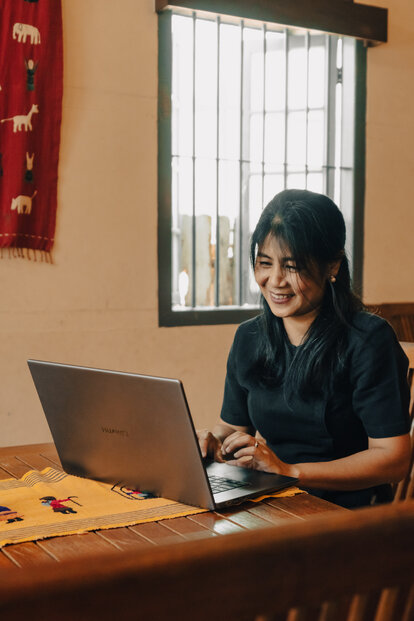
Question: "Why did you start She Creates, an initiative for women to collaborate? Is it your idea alone or did it involve others as well?"
Answer: "It was a collective decision of the group. It couldn’t have been done by just one person, even with the strongest will. I’m not an expert in handcrafts. The idea was that it would be better if women worked together, contributing what each one can. I had the idea that I could provide a place for them without charging a fee. We started talking about it in April and began running it from May to June. I didn’t charge for the place from that time until December. The thought was 'Let them try'. I wanted to give them a chance to attempt something. From January, I started charging for the place, not as rent but for long-term utilization with different milestones. It’s for the long run. If you want to go far, you need a lot of people. You can’t go far with just a few. Whenever you feel demotivated or discouraged, look at the people around you and you will find more strength. So, what I want to say to the youth is that in this era, don’t work alone; work with others. Working in a group makes you go further and achieve more. In a group, there are differences in opinion, but you adjust and work together. I prefer working in a group."
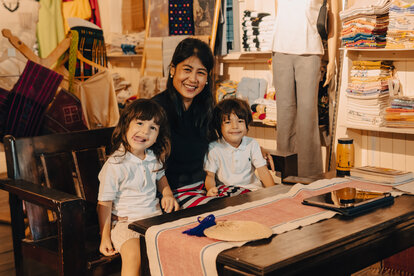
Question: "When did you start She Creates, and what are its objectives? Can you explain how She Creates came into existence?"
Answer: "I encountered this group at an International Women's Day event organized by the Spanish Embassy. Some of them were struggling due to COVID and the military coup; they were losing their way. Some couldn't pay their shop rents, and others were losing touch with their customers. The connections were breaking down. I also met people who didn't know what to do or what business to pursue. All these encounters stuck in my mind. After about a week, I called each of them and met them at my house to discuss. That's when I realized that if these women collaborated, they could create more job opportunities for women. That was the main idea."
Question: How many women started with her in "She Creates"?
Answer: We started with eleven (11) women. So, it began with eleven creators. We used a voting system to decide who takes on the principle role and other responsibilities. Currently, the Principle in charge of She Creates is Phyu Ei Thein from Sunflower Art Gallery. I'm just advising here. We are planning to expand She Creates to a western country because our artisans in Myanmar are not given opportunities to experience our crafts.
Question: How many members are there now?
Answer: There are now eighty-one (81) members.
Question: Where are the members from, and what kind of businesses are they involved in?
Answer: Most of them are from the handicrafts and art sector, including paper and sculpture works. There are also various brands involved.
Question: As for She Creates, how do you ensure that the products are not overpriced and how do you manage female entrepreneurs?
Answer: We have a team that controls quality. For pricing, if a creator wants to sell her product for 3000, we sell it for 3000. We don't interfere in pricing; that's up to the creators. Therefore, our prices are more reasonable compared to other handling crush stores.
Question: What are your goals for women in remote areas who are working on handmade projects?
How do you plan to help them reach international markets?
Answer: We always hang their brand profiles at our labor center along with their business cards. We are not a commercial place but rather a connector between the creator and the buyer. If they like a product and want to buy one or a hundred, they can take a business card, contact the creator directly, and order. We take a 15% cut, which goes towards room rent, staff salaries, electricity, and internet costs.
Question: Since your business focuses only on women, what challenges do women face in business based on your experience?
Answer: The main challenge they face when doing business is investment. There's a lack of sufficient funds. For instance, if they bring 50 pieces of a product, only those 50 pieces need to sell. If they don't, it becomes difficult for the next month. I think that's the main issue they face.
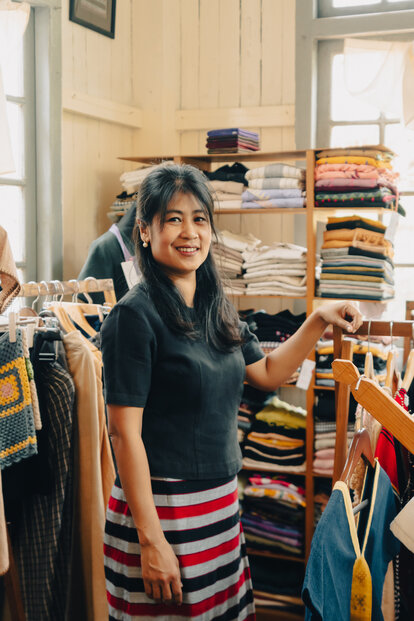
Question: What are the main challenges and difficulties faced by women at this time? How do they relate to political and economic instability?
Answer: As I mentioned earlier, financial issues are a major challenge. There's also psychological stress. In these times, it's hard to know what to do and how to manage. There are challenges, of course. We try to help each other out in our community.
Question: What are the differences between women running their businesses individually and working together as a group or collective of creators?
Answer: Working as a group means sharing ideas and collaborating, which leads to diverse and unique ideas. I think working together in this way is better. Everyone has different perspectives, but the power of the group is very strong.
Question: If women from remote areas want to join She Creates and sell their products, how can they do so?
Answer: They can become members. They need to call the showroom and fill out a form. After filling out the form, they send a sample of what they want to sell. We have a team that checks these samples. Once checked, we get back to them. The annual fee is about twenty thousand. Then we display and sell their products for them.
Question: Could you please give some encouraging words or advice for women at this time?
Answer: At this time, instead of working alone, it's better to join organizations and learn from what these groups are doing. Join them, take heart, and work together. It's better to work on something you are skilled at and use your strengths. Women, as well as young people, should remember that if they have a skill or knowledge in something, it will give them confidence for their entire life.
Thank you.
